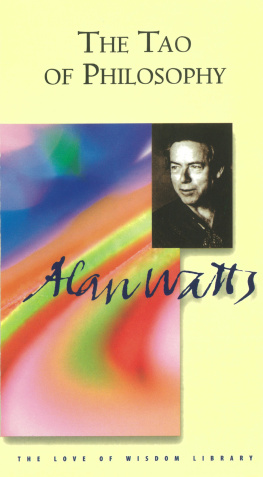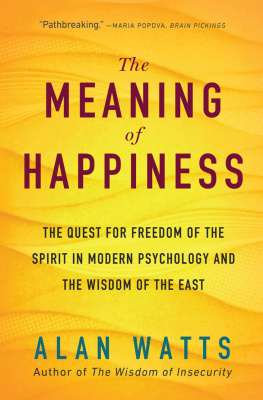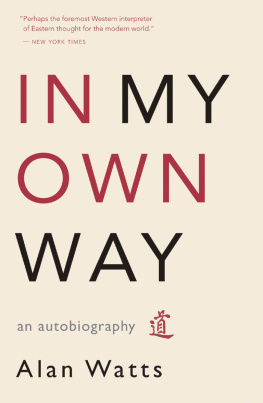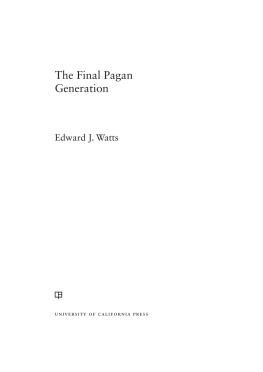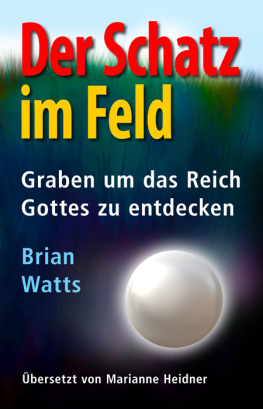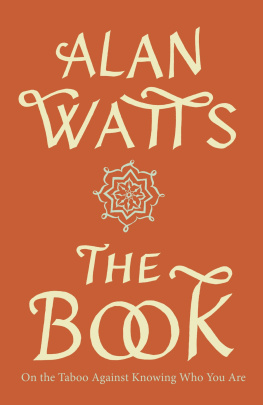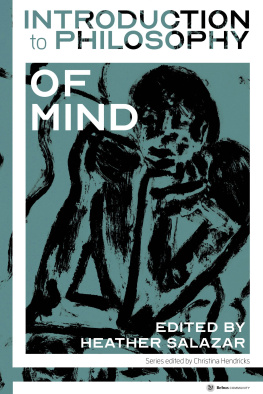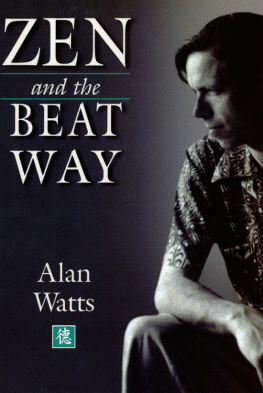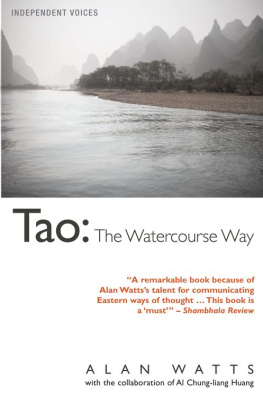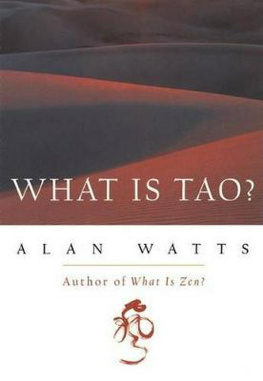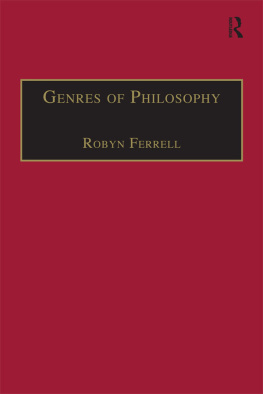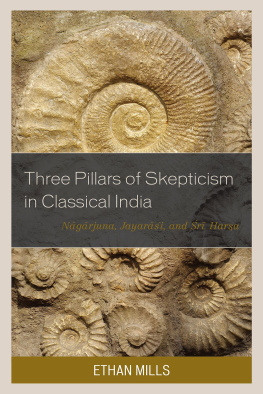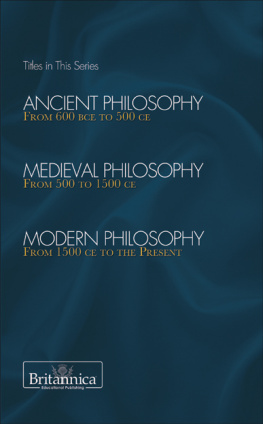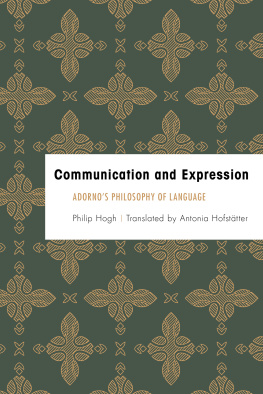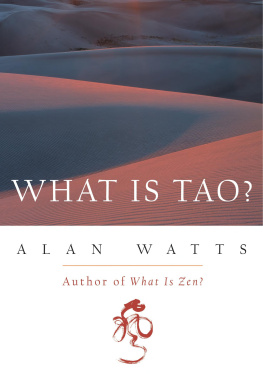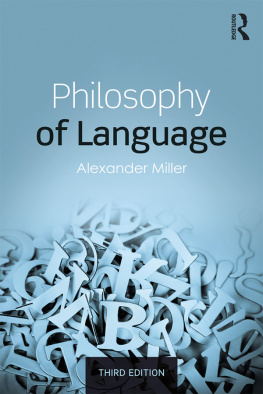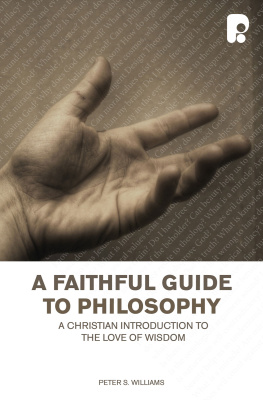
THE TAO OF
PHILOSOPHY

THE EDITED TRANSCRIPTS

ALAN WATTS
at a seminar aboard the Vallejo, 1966
THE TAO OF
PHILOSOPHY

THE EDITED TRANSCRIPTS

TUTTLE PUBLISHING
Tokyo Rutland, Vermont Singapore
First paperback edition published in 2002 by Tuttle Publishing, an imprint of Periplus Editions (HK) Ltd., with editorial offices at 364 Innovation Drive, North Clarendon, Vermont 05759.
Copyright 1995 Mark Watts
All rights reserved. No part of this publication may be reproduced or utilized in any form or by any means, electronic or mechanical, including photocopying, recording, or by any information storage and retrieval system, without prior written permission from the publisher.
Library of Congress Cataloging-in-Publication Data
Watts, Alan, 1915-1973
The Tao of philosophy: the edited transcripts / Alan Watts.
96p., 23cm.(Love of wisdom library)
1. Philosophy, Comparative. 2. East and West. 3. Philosophy.
I. Title. II. Series: Watts, Alan, 1915-1973. Alan Watts Love of wisdom library.
B799.W34 1995
Photo courtesy of Alan Watts Electronic Educational Programs
ISBN-10: 0-8048-3204-8
ISBN-13: 978-0-8048-3204-5
ISBN: 978-1-4629-1673-3 (ebook)
Distributed by:
North America, Latin America & Europe
Tuttle Publishing
364 Innovation Drive
North Clarendon, VT 05759-9436
Tel: I (802) 773-8930
Fax: I (802) 773-6993
www.tuttlepublishing.com
Asia Pacific
Berkeley Books Pte Ltd
61 Tai Seng Avenue #02-12
Singapore 534167
Tel: (65) 6280-1330
Fax: (65) 6280-6290
www.periplus.com
Japan
Tuttle Publishing
Yaekari Building, 3rd Floor
5-4-12 saki, Shinagawa-ku, Tokyo
Japan 141-0032
Tel: (81) 3 5437-0171
Fax: (81) 3 5437-0755
10 09 08 07 10 9 8 7
Cover design by Jeannet Leenderste
Printed in Singapore
Tuttle Publishing is a registered trademark of Tuttle Publishing, a division of Periplus Editions (HK) Ltd.
Dedicated to Al Chung-liang Huang
Contents
Introduction

W elcome to The Tao of Philosophy, and to some remarkable ideas about the role of philosophical inquiry and the true purpose of living. These thoughts spring from a life-long study of Eastern philosophy by an inspired and articulate Westerner, Alan Watts. A prolific writer and speaker, Watts is well known for his numerous books on Christianity, Zen, Hinduism, and Taoism, including his classic The Way of Zen. Originally from England, Watts was the Chaplain at Northwestern University during the time of World War II. Following the publication of Behold the Spirit in 1947, Watts left the Church in 1950, and soon thereafter traveled to California to teach at the Academy for Asian Studies in San Francisco with Dr. Fredrick Spiegelberg.
Three years later Watts began the Way Beyond the West radio series on KPFA in Berkeley. His radio talks were so well received in the Bay Area that they continued on KPFA for thirty years. At various times the shows also aired on other Pacifica stations in Los Angeles, New York, and Boston on Sunday mornings, and became popularly known as the hangover cure in the late sixties and early seventies. During this period the Los Angeles Times reviewed his books and described Watts as perhaps the foremost Western interpreter of Eastern thought. He spoke regularly at colleges, seminar centers, and progressive churches across the country. The Sunday radio programs were by that time recorded in the field instead of at the studios of KPFA, and his early radio style of presentation gave way to a dynamic speaking style that earned him a reputation as a modern philosopher/entertainer. Alan Watts passed away in 1973 in the midst of writing a companion volume to The Way of Zen on Taoism.
Recently, when I began to select original live recordings to re-introduce radio audiences to my fathers spoken works, many of his later talks with generally Taoist themes stood out as excellent examples of his mature philosophy. It was apparent that he felt comfortable with a view of the world which is of itself so, and not the construct of a personified ultimate reality. The wisdom of working with the course and current of nature to solve the problems of ecological balance also appealed to his sensibilities, and he spoke of the organism/environment as more nearly us than I.
The Tao of Philosophy is a literary adaptation of talks selected to introduce the new Love of Wisdom series to todays audiences. The following chapters provide rich examples of the way in which the philosophy of the Tao is as contemporary today as it was when it flourished in China thousands of years ago. Perhaps most significantly, these selections offer modern society a clearer understanding of what it will take for a successful reintegration of humans in nature.
We begin with a foreword written in July of 1953, entitled On Philosophical Synthesis. The contrast between the style of this earlier article and the following chapters reveals the transformation Watts underwent as he moved from the academic environment, in which these questions were first raised, to the personal experience, in which they were resolved. For as his close friend, poet Elsa Gidlow, wrote of his growing into the spirit of the Tao:
... it transformed him as he allowed it to permeate his being, so that the reserved, somewhat uptight young Englishman, living overmuch in his head, in his mature years became an outgoing, spontaneously playful, joyous world sage. He believed that a widespread absorption of the profound wisdom of Taoism could similarly transform the West.
Mark Watts
1995, San Anselmo, California
Foreword

On Philosophical Synthesis
I n many respects the formal, academic philosophy of the West has come to a dead end, having confined itself to a method of inquiry which compels it to move in a vicious circle. This is especially true in epistemology, which, because it involves the whole work of self-knowledge, is really the central problem of philosophy. As the West understands it, epistemology is really the task of trying to think thoughtto construct words about words about wordssince philosophical thinking is, for us, not a changing but a verbalization of experience.
The inquiring mind is perennially fascinated with the problem of the minds own nature and originsnot only to know just by way of information what knowing is, but also to employ such information for the greater control of the knower, for is it not frequently said that the problem of modern man is to be able to control himself as effectively as he can control his environment?
But there is a basic contradiction in the attempt of reason to transcend itself. To know the knower, to control the controller, and to think thought implies a circular and impossible situation, like the effort to bite ones own teeth. It is for this reason that modern logical philosophy tends to dismiss such inquiries as metaphysical and meaningless and to confine philosophy to the investigation of relatively pedestrian problems of logic and ethics. This situation has arisen in the West because, for us, to know really means to control; that is, to see how events may be fitted to consistent orders of words and symbols so that we may predict and govern their course. But this mania for control leads ultimately to a barren confusion, because we ourselves are by no means separated from the environment we are trying to control. Western man has been able to pursue this mania only so far because of his acute feeling of individual isolation, of the separation of his I from all else. Thus, in philosophy, in technology, and in the whole ordering of our society, we run into the ancient problem of Quis custodiet custodies? who guards the guard, polices the policeman, plans the planner, and controls the controller? The logical end of all this is the totalitarian state of George Orwells 1984, the nightmare of mutual espionage.
Next page
